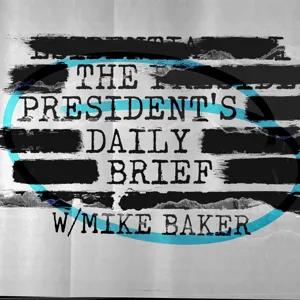Podcast Summary
Memorial Day Discounts from Burrow Furniture and Labour Party's Call for Ceasefire in Gaza: Burrow Furniture provides weather-resistant outdoor items with discounts for Memorial Day. The Labour Party advocates for a ceasefire in Gaza, causing internal conflict and debate in the UK government.
Burrow Furniture offers high-quality outdoor pieces with rustproof hardware, weather-ready teak, and quick-dry foam cushions, and they are currently offering discounts for Memorial Day. Meanwhile, in politics, the Labour Party has called for an immediate humanitarian ceasefire in Gaza, marking a shift in their stance from earlier this year. This led to chaos in a recent House of Commons debate, with accusations of the Speaker of the House allowing Labour to hijack the debate. The Labour Party has faced significant internal rebellion over their stance on the issue, with multiple resignations from MPs and councillors. Despite this, the party's recent amendment passed in the House of Commons, and it remains to be seen if their official position has truly changed.
House of Commons Vote on Israeli-Palestinian Conflict Causes Chaos for SNP: The House of Commons vote on the Israeli-Palestinian conflict resulted in chaos, with the SNP feeling their views were ignored and potential rebellion within Labour ranks. Despite this, Labour's motion for a ceasefire with conditions was passed.
Yesterday's votes in the House of Commons on the Israeli-Palestinian conflict resulted in chaos, with the Scottish National Party (SNP) feeling their views were being ignored. Labour's motion, which called for a ceasefire with conditions, was seen as similar to the position of the Scottish National Party (SNP) but not a complete reversal. The Labour Party faced potential rebellion within their own ranks, but in the end, their motion was passed without one. The SNP was angered by the absence of the Speaker of the House of Commons during the vote, which they believed made their votes irrelevant. Overall, the day was marked by confusion and frustration, with various parties expressing their differing viewpoints on the conflict.
Political chaos over Israeli-Palestinian conflict in UK parliament: The UK parliament's debate over the Israeli-Palestinian conflict descended into chaos due to complex political maneuvering, resulting in a loss of parliamentary authority and potential safety concerns for MPs.
The recent chaos in the UK parliament over the Israeli-Palestinian conflict was a result of complex political maneuvering between the Tories, SNP, and Labour, but ultimately, it descended into unedifying scenes that overshadowed the seriousness and importance of the issue at hand. The speaker's decision to allow a fudge on the issue created a trap for Labour, leading to a heated debate and the potential loss of parliamentary authority and signaling power. Moreover, the incident highlights a wider concern about the safety and security of MPs, as the crowds outside Westminster were vast despite the relatively low attendance in the chamber. This incident underscores the need for respectful and productive political discourse and the potential consequences of turning important foreign policy debates into internal parliamentary disputes.
Pressure on Labour MPs and safety concerns influenced parliament vote: Intense pressure on Labour MPs from protesters and safety concerns influenced the Speaker's decision to allow a vote on an Israel-Palestine amendment, highlighting the seriousness of the issue and potential risks for politicians.
The recent events in the UK Parliament surrounding the vote on a Labour amendment related to Israel-Palestine conflict were not just about procedural games as they may have appeared. The intense pressure on Labour MPs from protesters and the concerns for their safety played a significant role in the Speaker's decision to allow a vote. However, it's important to note that procedural matters do matter in parliament and the S&P's position and Labour's position on the issue had notable differences. The speaker's decision to give MPs multiple options was also aimed at addressing the strong feelings of constituents on the issue. Despite the calls for his resignation from some MPs, Lindsey Hoyle's position is not yet clear on whether he can be ousted. Overall, this situation underscores the seriousness of the issue and the potential risks involved for politicians in taking a stance.
Pressure on Speaker of the House of Commons to Resign: Speaker of the House of Commons, Lindsey Hoyle, faces calls to resign due to controversial decisions, but Labour MPs support him, while SNP and some conservatives demand his resignation. The decision to allow MPs to vote on all three versions of a language amendment is a major point of contention.
Speaker of the House of Commons, Lindsey Hoyle, is facing increasing pressure to resign following controversial decisions made during a recent parliamentary session. While there is precedent for a Speaker resigning under such circumstances, Hoyle currently maintains the support of many Labour MPs. However, the anger against him is primarily coming from the SNP and some conservatives. The government has stated that this is a matter for MPs to decide. Some MPs argue that Hoyle's experience and reputation for impartiality are crucial during the election year and the current febrile political climate. However, the perception of collaboration between the Speaker and the Conservatives may not play well with the wider public, particularly in Scotland. The Speaker's decision to allow MPs to vote on all three versions of a language amendment, which benefited the Conservatives, has been a point of contention. The debate continues as to whether Hoyle should step down or not, with some suggesting potential alternatives.
Threats against MPs influencing political decisions: The fear and intimidation faced by MPs is a democratic concern, influencing votes and decisions, and needs to be addressed to ensure free and fearless legislative process
The issue of threats against MPs and their influence on political decisions has become a significant democratic concern in the UK. The recent events in the House of Commons, involving Labour's amendment on the Israel-Palestine conflict and the subsequent withdrawal of Conservative and SNP amendments, have highlighted the fear and intimidation MPs face. This issue is not new, but when it starts influencing votes and MPs feel compelled to act out of fear rather than their own thoughts, it poses a broader democratic problem. The situation is escalating, with candidates filling the vacuum left by major parties in constituencies like Rochdale. The feeling among the public on this issue is also growing stronger. It's crucial to address this issue and ensure that the sovereign legislators of the UK can make decisions freely and without fear of intimidation.
Israeli-Palestinian conflict impacts Labour Party in UK: The Israeli-Palestinian conflict is causing emotional distress and tension in areas with large Muslim populations, leading to challenges for Labour MPs and a drop in Labour support. The issue is not openly discussed due to threats and police advice, but requires a more comprehensive solution beyond polite discourse in parliament.
The Israeli-Palestinian conflict is causing significant issues for the Labour Party in the UK, particularly in areas with large Muslim populations. This is due to both independent pro-Palestinian candidates challenging Labour MPs and a drop in Labour support among British Muslims. The issue is not being openly discussed in public by Labour MPs due to threats and police advice, leading to a collective wish for silence. The conflict's impact on the ground, such as in Gaza where half the population has fled, is causing emotional distress and increasing tensions. It's important to note that the issue goes beyond polite discourse in parliament and requires a more comprehensive solution.





